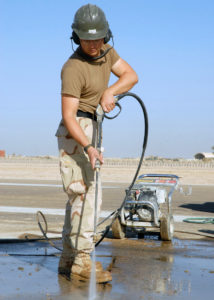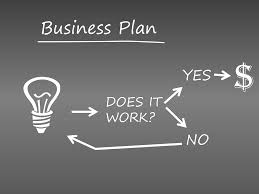 If you’re considering starting your own power washing business, you will find that it is a lucrative line of work and that just about anyone can enter into this industry. Since it is a labor-intensive kind of service, you’ll need to be in top physical shape and have the necessary stamina to work with the equipment. Of course, you’ll also need some amount of business acumen to successfully set up and run your company. As compared to most other professions, the pressure cleaning business typically needs you to invest a lesser amount of finances. In the initial stages, you can provide the services yourself, but as your company grows, you can consider hiring employees to keep up with the number of contracts you’ll land.
If you’re considering starting your own power washing business, you will find that it is a lucrative line of work and that just about anyone can enter into this industry. Since it is a labor-intensive kind of service, you’ll need to be in top physical shape and have the necessary stamina to work with the equipment. Of course, you’ll also need some amount of business acumen to successfully set up and run your company. As compared to most other professions, the pressure cleaning business typically needs you to invest a lesser amount of finances. In the initial stages, you can provide the services yourself, but as your company grows, you can consider hiring employees to keep up with the number of contracts you’ll land.
What is Pressure Washing?
As opposed to the traditional methods of cleaning that involve soap, water, chemicals, and a good amount of scrubbing, pressure washing can deal with the problem with less than half the effort. Pressure or power washers as they are also called are super hoses that use pressurized water jets on the dirt and grime you see. The force exerted by the water sprays ranges from 1500 to 3000 pounds per square inch or psi. As the high-powered water is aimed at the surface to be cleaned, it dislodges dirt quickly and whisks it away. Aside from the dirt you see, pressure cleaning can be used to clear dried grass blades, mildew, pollen, algae, and mud from an extensive range of surfaces. It can even remove blistered and flaking paint.
How Does Pressure Cleaning Work?
The chemical cleaning agents like soap and detergents that you use break down the basic composition of the dirt and grime so that water can easily wash it away. But, the dirt that is lodged too deep into crevices or has had time to settle in typically does not respond to the soap and scrubbing. High-pressurized water molecules, on the other hand, have dual electrical polarity with both positive and negative charges. Not only can they stick to the particles of dirt, but also the kinetic energy of the high speed helps to knock it free. Think of raining tiny hot or cold hammer blows on the dirt and grime. Further, since you’re using only water, you’re not likely to damage the hard surfaces on which you use the pressure washer.
Understanding the Pressure Cleaning Business
 Before you get started on the pressure cleaning startup you have in mind, it is advisable that you get a feel of what the profession and services are all about. Operating the power washer is a fairly simple task and is not really time consuming. However, you’ll need to familiarize yourself with the safety measures to take and the specific techniques to use on different kinds of surfaces and types of dirt.
Before you get started on the pressure cleaning startup you have in mind, it is advisable that you get a feel of what the profession and services are all about. Operating the power washer is a fairly simple task and is not really time consuming. However, you’ll need to familiarize yourself with the safety measures to take and the specific techniques to use on different kinds of surfaces and types of dirt.
Consider working for a while as an intern for a power cleaning company and get the training you need. You can also practice the skills in your own home and for friends by cleaning surfaces like tiled patios, driveways, back decks, house sidings, patio furniture, fences, cars, garbage bins, and lawn mowers, for starters. To further hone your skills, consider taking practical lessons from internet sites. Understand what precautions you must take to ensure that the pressure washer jets don’t damage the areas around the target and how to manage the debris that arises from the cleaning procedures.
Acquiring the Necessary Skills
If you are uncomfortable learning the skills needed on your own, look for the relevant certification courses from accredited continuing education schools. You can also look to trade schools to acquire the training you need. Keep in mind that the state where you intend to work your pressure cleaning business might have regulations in place with regard to the company you want to start. You might need to show certification to prove that you have the necessary education and qualifications to run the business and that you are aware of the rules and safety precautions related to the practice. Showing this certificate can help you obtain the mandatory contractor license.
Why Pressure Cleaning Services
Many people are increasingly opting for pressure cleaning services to maintain their homes and commercial establishments. To begin with, cleaning with power washers is an environmentally friendly approach to cleaning the dirt and grime from the interiors and exteriors of buildings. The pressurized jets of water can easily reach hard to find nooks and crannies and leave them spotless. Not only do these services leave the areas clean, but they also eliminate health hazards like dust, pollen, and other allergens. Cleaning buildings and vehicles from time to time prolongs their life and protects them from damage. Perhaps, the most important positive is that a thorough cleaning can raise the asset worth and net value of your property.
Planning for the Services to Offer
The pressure cleaning business is very diverse and has innumerable applications. Since it uses water at high speed, it can be used to clean almost all hard surfaces. You can choose to begin with small contracts and limited areas while you’re getting your company off the ground. As your experience levels grow, you can move on to bigger jobs. For instance, start off with cleaning trucks, cars, and other vehicles, garages, houses, log homes, and similar building exteriors, construction and farming equipment, sidewalks, parking lots, and kitchen vents and chimneys, among others. Larger projects can include cleaning sports stadiums, manufacturing plants, and even, aircraft bodies, to name a scarce few.
Acquiring the Licenses, Permits, and Insurances
When setting up your pressure cleaning business, make decisions whether you would prefer to establish a corporation or a limited liability company. Accordingly, you’ll need to pay the applicable filing fee as mandated by your state laws. Contact your state department of revenue and business regulatory centers for a local business permit. Also, place your application with the county clerk office for the state tax registration and obtaining the necessary licenses. Make sure you get the applicable liability insurance to protect yourself from damages that might occur when working on the properties of your clients. If you’re not sure about the legal implications, talk to a certified expert or lawyer.
Acquiring the Equipment Needed
 You’ll need to invest in a range of high-power water hoses along with the nozzles for your pressure washer. Check for their power, hot and cold water capabilities and the fuel source you’ll need. In addition, you’ll need chemicals and other cleaning agents depending on the surfaces you’ll clean and the kind of dirt to remove. You can find this equipment at hardware supplies stores that cater to landscaping and janitorial service companies. It is always advisable to work with a local store. Over time, you can get into a partnership and perhaps, source your supplies at bulk rates. You might even work out a business relationship and get referrals to customers.
You’ll need to invest in a range of high-power water hoses along with the nozzles for your pressure washer. Check for their power, hot and cold water capabilities and the fuel source you’ll need. In addition, you’ll need chemicals and other cleaning agents depending on the surfaces you’ll clean and the kind of dirt to remove. You can find this equipment at hardware supplies stores that cater to landscaping and janitorial service companies. It is always advisable to work with a local store. Over time, you can get into a partnership and perhaps, source your supplies at bulk rates. You might even work out a business relationship and get referrals to customers.
In addition, you’ll have to buy a truck or heavy-duty van where you can load and carry your equipment to the work site. Choose between a new or used vehicle depending on the budget you can allocate to it.
Maintaining Your Equipment
Understand how to keep your equipment in proper working order at all times. You may find that the cleaning business is slow in the winter months. If you need to store your gear, make sure that the garage or shed has the necessary insulation to prevent your vehicle and tools from freezing. When you ready your machinery for the next season, work with trained experts to clean the accumulated dirt and debris before you begin using it again. Prepare for the fact that over time, with repeated use, your equipment will need repairs, and breakdowns are inevitable.
Creating the Business Plan
Before you begin, one of the first steps you must take is to draw up a business plan. A good plan must give you a clear view of the startup and operational expenses you’re likely to incur. Also, factor in the incidentals and unexpected costs that might have to be included. Put down the expected capital you’ll need to cover the cost of the equipment and transportation to the work sites. Plan for the insurances you’ll have to buy and the licensing fees. If you feel you’ll need to hire help, factor in the wages you’ll pay. While your business is still new, you’ll have to incur advertising expenses also. Next, work out the client base you intend to target and the expected earnings per client. Calculate the difference between your earnings and your costs and you’ll arrive at a figure that gives you an estimate of the profits you can make.
Estimating Startup Costs
An important part of your business plan is estimating the costs you’re likely to incur in the initial stages of your business. If you feel that the equipment and vehicle you need are too expensive, consider the option of leasing them in place of buying them. You can always purchase them as your pressure cleaning business grows. Here is an estimate of the finances you might need.
Power Washing Equipment: Between $1,000 and $1,500
High-quality Pressure Washers: Over $6,000
New Truck or Van (according to the applications): Between $20,000 and $40,000
Used Truck or Van: $5,000
Getting Logos Printed on the Trucks: $500
Insurances, Licenses, and Permits; (depending on your state laws): $500 one-time and $60 per month, can go up to $2,000
Advertising costs such as printing and flyers: $250
Estimating Pricing
 Giving an estimate to your customers on the pricing involves many factors. When you’re called in to study the areas you’ll clean, factor in the time it will take you to get the job done. Next, work out the chemicals, materials, and fuel you’ll use up. Think about the profit you expect to make. You might want to study the prices offered by your competitors and other contractors in your area to get an idea of what a cleaning service should cost. You can also estimate the profit depending on the kind of area you’ll clean. When presenting your estimate, it is advisable that you give a breakup of the costs like for instance, a per square foot rate so that the price you ask seems fair and reasonable to your customers.
Giving an estimate to your customers on the pricing involves many factors. When you’re called in to study the areas you’ll clean, factor in the time it will take you to get the job done. Next, work out the chemicals, materials, and fuel you’ll use up. Think about the profit you expect to make. You might want to study the prices offered by your competitors and other contractors in your area to get an idea of what a cleaning service should cost. You can also estimate the profit depending on the kind of area you’ll clean. When presenting your estimate, it is advisable that you give a breakup of the costs like for instance, a per square foot rate so that the price you ask seems fair and reasonable to your customers.
To give you a few examples:
Homes: $0.08 to $18 per square feet or $0.50 to $2.00 per linear foot
Mobile Homes (depending on single or wide): $40 to $65
Roofs (depending on material like cedar or composition): $0.10 to $0.90 per square foot
Parking lots: $0.03 to $0.20 per square foot
Driveways: $8 to $30 per lane
Advertising Strategies
Like with any other business, you need to advertise your pressure cleaning company to attract customers and clients. Contact your printer and order the necessary fliers, brochures, and business cards to pass around. Get your sign maker for portable signs for your vehicle and for putting up on the site where you’re working. You can also order wrap around signs for your truck that have your phone number and other contact details. Reach out to potential customers as your truck is seen around town. While you can rely on word-of-mouth strategies for advertising, you can also consider buying ad space on a related website. Consider setting up your own website and if you have the finances, develop a television commercial and buy ad time.
Using this information, you can consider starting up a pressure cleaning business of your own. While this article can give you a fair idea of what you’re getting into, you can expect that you’ll be constantly learning on the job. As you keep working, you can expand your customer base and take up bigger and more challenging projects that test your mettle. Like with any other business, you must adopt ethical methods of working, provide the best of services possible, and charge your customers fairly. You stand to grow your business and make an awesome success of it.
References:
1. McKay, Matt. “How to Start a Small Pressure Washing Business.” Houston Chronicle. N.d. Web. 2 Aug. 2016.
2. Arthur, Luke. “How Much Does It Cost to Start a Pressure Washer Business?” Houston Chronicle. N. d. Web. 2 Aug. 2016.
3. “What Everyone Ought To Know About Starting A Pressure Washing Business” Pressure Washr. N.d. Web. 2 Aug. 2016.
4. “Can I Start a Business with a Cheap Pressure Washer, and Then Save Up For a Professional Pressure Washer?” Power Wash .com. 1 July 2014. Web 3 Aug. 2016.
5. “Cost to Starting a Power Washing Business” Power Wash .com. 31 May 2011. Web. 3 Aug. 2016.
6. “Pressure Washing Business Plan for Mobile Power Wash Contract Cleaning Business” Power Wash .com. 30 May. 2011. Web. 3 Aug. 2016
7. Woodford, Chris. “Pressure Washers” Explain That Stuff. 28 Feb. 2016. Web. 3 Aug. 2016.
8. “Pressure Washing Prices and Rates” Pressure Net .net. N.d. Web. 4 Aug. 2016.
9. “Pressure Cleaning Services and Its Advantages.” Pressure Cleaning Services. 26 May 2015. Web. 4 Aug. 2016.
10. Hinckley, Larry. “Pressure Washer Maintenance.” Power Wash .com. 16 Oct. 2010. Web. 5 Aug. 2016.






